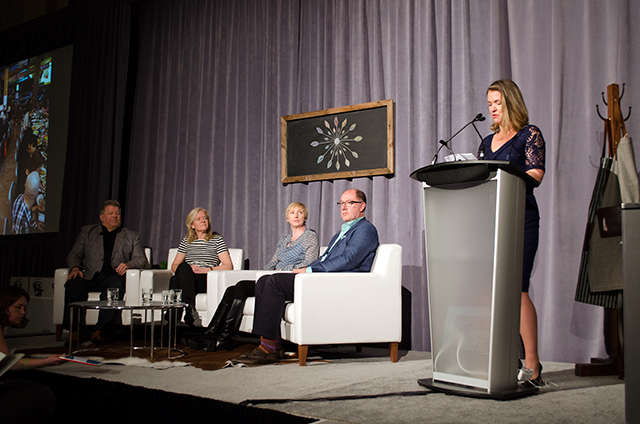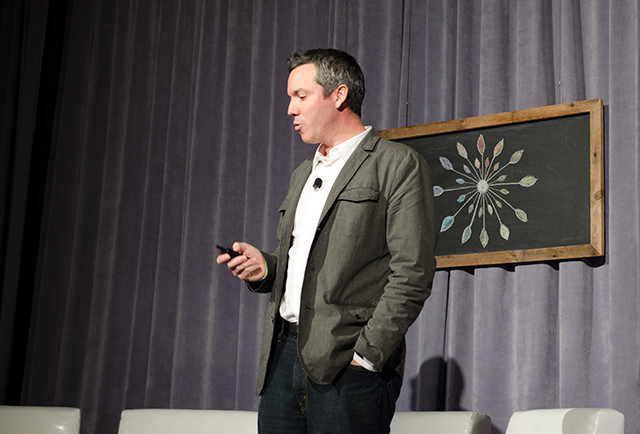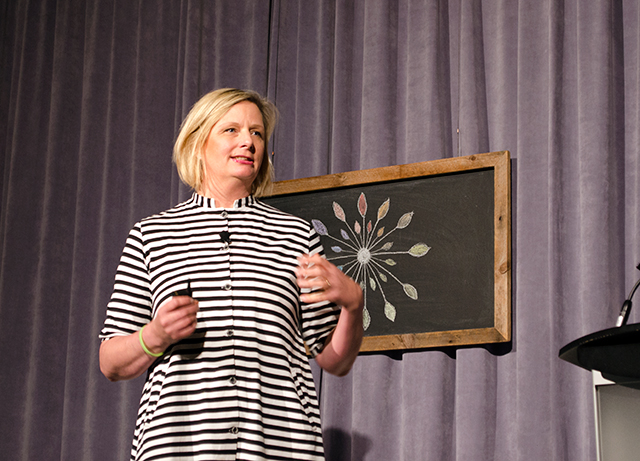On May 12, 2014 I attended the most exciting and terrifying event of my food blogging career: the Terroir hospitality industry symposium.
This annual gathering of chefs, food writers, restaurant owners, wine experts and industry leaders is one of the most highly anticipated events in the Canadian culinary world.
When Melissa and Ethan asked me to cover this event for Food Bloggers of Canada, I was elated! I would finally have the opportunity to attend this highly regarded event, and I liked the theme for this year: Growing Ideas. That feeling lasted for about two hours, and then I started to panic.
After all, this is an event where “the innovative and creative influencers of Canada’s hospitality industry”* come together to share ideas, educate their peers and build a community of food professionals. How would I fit in amongst all of that talent?
When the big day finally arrived, I sat down in a large hall inside of the gorgeous Arcadian Court. The room was filled with people who were laughing, smiling and shaking hands. I took a deep breath, pulled out my camera, notebook and pen, and tried to mentally prepare myself for what I thought would be complicated and technical lectures.
Peter Oliver kicked off the event by welcoming everyone to the 8th Annual symposium. No wonder so many people seemed to know each other – this event has been happening for almost a decade! As a new attendee, I felt a bit left out.
My anxiety finally began to disappear when the first presenter, Krystina Roman of Rosewood Wines, began talking about teamwork while wearing a beekeeper’s suit.
It turns out that the Terroir symposium is more accessible than you might think. While a few of the presentations did have culinary jargon that I didn’t understand (I don’t know a darn thing about wine!), most of them focused on ideas and concepts that anyone could apply to their daily work.
Ten takeaway points that to help you grow your ideas:
1. Allow yourself to rely on help from others.
In Krystina Roman’s presentation she made comparisons between people and bees. She explained that, like bees, humans can't always work efficiently or successfully without help from other people. We shouldn’t be afraid to ask for help from our support groups when we need it.
2. Diversity is key.
Krystina also told us to look for new opportunities, the way that bees forage for new types of pollen. In her presentation she showed us that by diversifying our ideas, we could discover new potential.
3. Be less exclusive and more inclusive.
Alessandro Porcelli, founder of Cook it Raw, interviewed the remaining members of The Group of Seven Chefs. In their discussion we learned that we can benefit from opening up our network to include more people who are different from us, rather than trying to surround ourselves with people who are similar to us. It’s beneficial to surround yourself with people who have different educational or cultural backgrounds, we can gain a broader perspective on our work.
4. Collaboration can lead to education.
Matty Matheson, executive chef at Parts and Labour, explained how The Group of Seven Chefs started as a collaborative project back in 2010. The premise was that these chefs would gather on their days off so they could cook together, network and share ideas. Matty said, “It’s nice to be in the kitchen with someone who has a different background and different skills so you can learn from them”.
5. Learn how to identify your problems.
Kevin Patricio, chef and restaurateur, explained to us the difference between a identifying a problem and identifying the symptom of a problem. He suggested that we should try to peel away the layers of our perceived problem in order to see what our actual issue is.
6. Great teams don’t always get along.
Jill McAbe, a certified executive leadership coach, described her experience working with a team that claimed to never disagree or argue. She said she was not surprised when that team eventually fell apart because good teams should disagree from time to time. She pointed out that if everyone is agreeing than someone is not speaking up about their opinion. Great teams should listen to each other fully and disagree respectfully in order to communicate effectively.
7. Find what’s unique in your neighbourhood.
There was a very interesting discussion about culinary tourism between Rebecca LeHeup, executive director of the Ontario Culinary Tourism Alliance, and hospitality professionals from Alberta, Sweden and Ireland. These people were discussing ways to highlight unique food experiences for tourists, but the concept can be easily adapted to food bloggers. Find what’s unique in the area that you live, and highlight it on your blog. Can you schedule a meet up for your readers there? Are there certain restaurants, orchards or cooking schools that you can research and write about? Focus on what’s local!
8. Find new ways to celebrate local cuisine.
One of my favourite presentations from the event was Mara Jernigan, the self-proclaimed Chef in the Jungle. Mara is the head chef at Belcampo Belize where she is trying to build new Belizian cuisine. She teaches local cooks how to butcher meat, runs bean-to-bar chocolate classes, and encourages her staff to celebrate the local fare including vanilla, coconuts and lionfish. What local provisions or cuisine can you focus on in your area?
9. Tell good stories on the front; work with good brands/people behind the scenes.
I might be taking concept out of context a bit, but when Nathan Thornburgh, co-founder of Roads and Kingdoms, talked about storytelling and brands my brain immediately went to sponsored posts. How often do we see posts that are blatantly advertising a product? I’m guilty of doing that myself. We should all be focusing on telling good stories instead of promoting brands, and make sure that we stand behind those brands too.
10. Why not be the best at being yourself?
This might have been the simplest statement of the entire event, but I think it was the most important. In the middle of Fia Gullikson’s presentation, an explanation of her role as a Food Ambassador, she blurted out this statement in a moment of exasperation. She’s got a good point too. It’s easy to get caught up in trying to emulate successful people in our industry, and sometimes we forget to focus on our own strengths.
Ten Takeaway Points From Terroir 2014 was written by Shareba Abdul. Shareba is a food blogger and freelance writer from the GTA. She holds an Honours Bachelor of Applied Arts in Media Studies, a Diploma in Journalism, and has a passion for writing, photography, and blogging. You can check out her yummy discoveries at InSearchOfYummyness.com or connect with her on Facebook, Pinterest, Twitter and G+.













[…] was beyond excited for dinner, especially since I had just heard David Chang speak at the Terroir Symposium. David said that if people are talking in his restaurants, then the food is not good enough. He […]